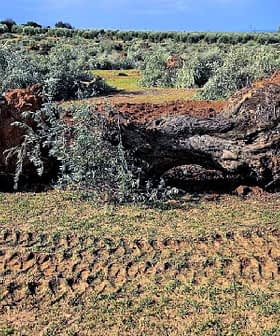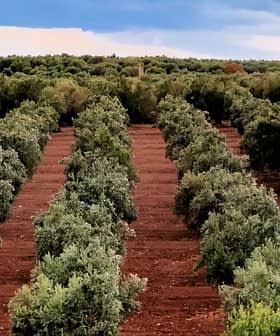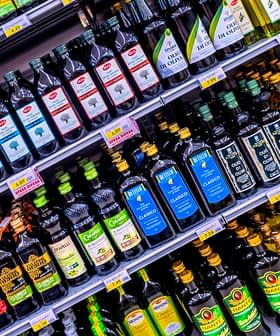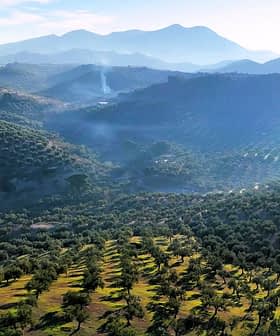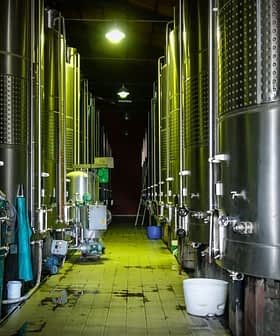200,000 Olive Farms in Spain Could Vanish in Next Decade, Report Finds
According to a new study, more than 320,000 acres of traditional olive groves are abandoned and 1.2 million acres more could be also lost, equal to one-fifth of the total land area of all Spanish olive groves.
 5.1K reads
5.1K readsA study by Deoleo warned that 240,000 small olive oil farms in Spain may disappear within the next decade due to international competition, falling consumption, and stagnant prices. The study, titled “Save the good oil,” highlighted the decline in traditional olive tree farming in main Spanish olive oil producing regions, emphasizing the need for collective action to prevent further damage and preserve the unique social, economic, and environmental role of traditional Spanish olive groves.
A study released by multinational firm Deoleo warned that 240,000 small olive oil farms in Spain could vanish over the next 10 years.
The international competition in the olive oil sector, which inevitably leads to more olive oil produced globally, in conjunction with a relative fall in consumption and the stagnation of prices in the country, makes it hard for small Spanish producers to retain their position in the market.
It is possible and necessary to reverse the situation, it takes the commitment of the agents of the sector to maintain a type of olive grove that has an important social, economic and environmental role.
The study, entitled “Salvemos el buen aceite” or “Save the good oil,” focused on the main olive oil producing territories of Spain – Andalusia, Castilla — La Mancha, València, Aragón and Catalonia – and found that more than 320,000 acres of traditional olive tree farming have already been abandoned in these areas.
The explanation for the decline lies in numbers, with 64 olive oil producing countries in the world today, compared to 46 countries fifteen years ago. A total of 28.7 million acres of land are covered with olive trees, and every second there are, on average, 10 olive trees being planted somewhere on the planet.
See Also:Spanish Olive Oil ProductionFurthermore, almost 40 percent of the total quantity of olive oil comes from intensive farming, which yields almost 50 percent more than traditional farming at half the cost.
This expansion of cultivated land and olive oil output creates an imbalance between supply and demand at a global level, with more olive oil being produced than consumed.
While overall global consumption has increased by 6.4 percent during the last nine years, the study stated, a cutback has occurred in mature markets such as Spain, Italy and Greece, where consumers have reduced their intake of olive oil by 16 percent on average translating to 286,000 tons collectively.
Meanwhile, increases in consumption in other markets, such as Germany, France and the United States, have slowed down over the same time period.
In that sense, an estimated surplus in olive oil production of one to two million tons each year will lead to lower prices in most markets, including Spain, where prices today are below all the other producer countries worldwide.
Prices of olive oil demonstrate a negative outlook in the recent weeks in Spain settling at €2.20 ($2.49) per kilogram of extra virgin, with the agricultural organization COAG warning that these prices are already below the profitability threshold.
With the current trend of loss in consumption, the small margin for profit and the expansion of olive tree cultivation worldwide, traditional Spanish olive groves could become unsustainable and lose another 1.2 million acres within a decade, the study concluded, representing 20 percent of all Spanish olive groves.
The loss would affect 240,000 small farmers with 2.5 to 7.5 acres of land, driving them out of existence, the study warned. Almost 300,000 local families who are one way or another associated with the olive oil sector would be impacted.
The need for producers to yield more olive oil in order to stay competitive poses another threat to the traditional Spanish olive oil sector. There is a lot of pressure for these smaller producers to switch to fully mechanized, intensive cultivation methods of high performance but low quality, which are not suitable for small traditional farms with big, irregularly planted olive trees.
The situation mainly affects the native olive varieties of Spain, especially the Picual variety, which falls victim to intensive olive farming. Intensive farms tend to cultivate other varieties, which are selected for their higher output and not for their antioxidant properties and rich organoleptic characteristics, like Picual is.
Even worse, the environmental benefits traditional olive orchards offer, such as preserving the land from desertification and absorbing large amounts of carbon dioxide, are now gone due to the age and size of the trees, since intensive farming mainly uses younger and smaller trees with less foliage and shorter roots.
Juan Vilar, the author of the study and an expert on the olive oil sector of Spain, called for collective action to prevent further damage.
“It is possible and necessary to reverse the situation, it takes the commitment of the agents of the sector to maintain a type of olive grove that has an important social, economic and environmental role, which is typically Spanish and which, due to its uniqueness, provides a huge richness and variety to the offer of olive oil,” he said.
Eventually, it comes down to prices of olive oil increasing in the country to prevent the abandonment of traditional olive orchards in the coming years, the study suggested.
In the long run, the transformation of the Spanish olive grove from traditional to modern for better yield in terms of quantity could backfire and apart from the environmental repercussions could lead to the disappearance of Spanish indigenous olive varieties.




